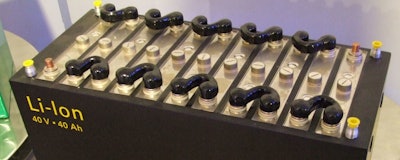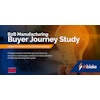
 Erica Moyer, Product manager, energy storage systems, The Raymond Corporation
Erica Moyer, Product manager, energy storage systems, The Raymond Corporation Although lithium-ion technology has been around for decades, it is receiving increased attention in the material handling market. Since the late 1970s, research into lithium-ion technology has continually evolved its chemistries and processing iterations. The ability of lithium-ion batteries to store more energy in a smaller footprint has made it a common energy source for laptops, cell-phones and tablets. It is this benefit, as well as many others, that has led to its increased attention within the material handling market as an alternative energy source to its traditional lead-acid counterpart. Lithium-ion technology offers a wide range of other benefits that enhances its attractiveness to material handling market:
- Lithium offers a low internal resistance and often operates at a higher voltage. When used within lift truck applications, this creates more efficiency when operating as this delivers and maintains a constant current. Low internal resistance also offers the advantage of generating less heat, adding to its efficiency as less energy is lost.
- Lithium-ion batteries do not require the traditional maintenance (watering, equalizing or special cleaning) required when compared to lead-acid. Lithium is a completely sealed alternative, making maintenance faster and simpler.
- Lithium has the ability to be opportunity-charged, or fast-charged, and overall requires less charging and handling. In fact, lithium can be charged up to eight times faster than traditional lead-acid and does not require a cool-down period.
- Based on its design and features, some lithium packs have the ability to be used in cold and freezer applications without the degradation of performance commonly seen in lead-acid batteries.
- The overall life of a lithium-ion battery is greater than other traditional battery options, lasting two to three times longer. Due to this extended lifetime, fewer batteries are needed per forklift.
Lithium-ion batteries are addressing and meeting the demands of the current material handling market, providing a solution that reduces labor and maintenance time, and decreases the need for extra batteries. By embracing innovations that enhance the quality and efficiency of material handling equipment, warehouse solutions providers can further exceed customer expectations.
Erica Moyer is the product manager of energy storage systems at The Raymond Corporation.























